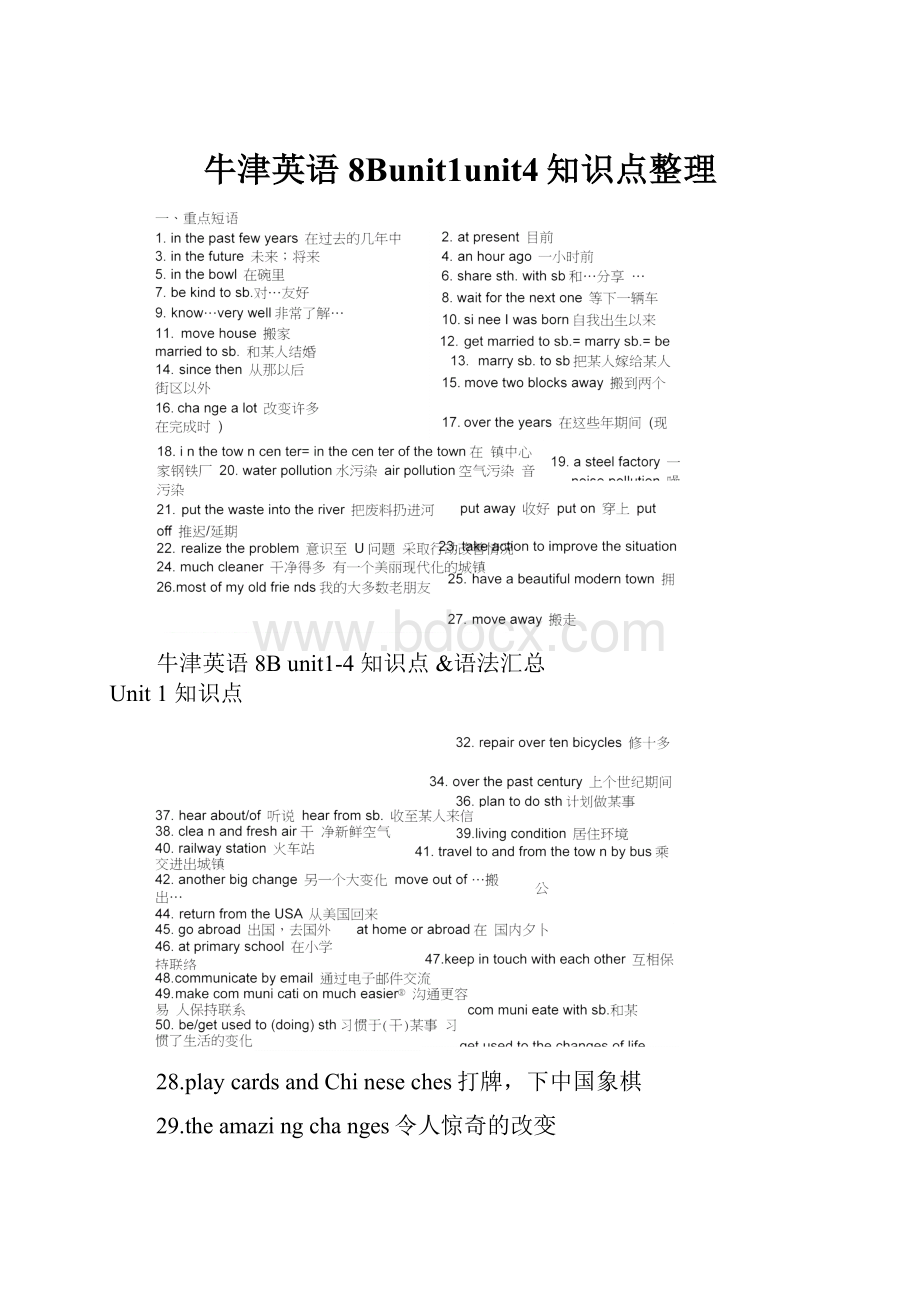牛津英语8Bunit1unit4知识点整理.docx
《牛津英语8Bunit1unit4知识点整理.docx》由会员分享,可在线阅读,更多相关《牛津英语8Bunit1unit4知识点整理.docx(27页珍藏版)》请在冰豆网上搜索。

牛津英语8Bunit1unit4知识点整理
牛津英语8Bunit1-4知识点&语法汇总
Unit1知识点
28.playcardsandChineseches打牌,下中国象棋
29.theamazingchanges令人惊奇的改变
30.agroupofbuildingswithstreetsonallsides街道两边全是高楼31..allone'sI某人的一生
辆自行车
33.thechangesinBeijing北京的变化
35.learnmoreabout更多了解关于
51.takeplace发生(有目的有计划的)、举行happen发生(偶然发生)
52.greenhillsallaround到处都是绿山
53.ariverrunsthroughthecentreoftown—条小河穿过镇中心
54.onone'sown=byoneself=a独n自
55.throwrubbish扔垃圾56、insomelargeopenspaces
在一些大的开阔的地方
57、intheirfreetime在他们业余时间58、travelaroundthetown在
镇里转转
59、havetheirowncars=havecarsoftheirown有他们自己的汽车
60.narrowanddirtyroads又窄又脏的公路61.wideandcleanstreets宽阔
而干净的街道亠
62.greentreesonbothsides两边绿树63.enjoyacomfortablelife享
受舒服的生活
64.fromtimetotime=attimes=sometimes有日寸
二、词汇梳理
1.1'vejusteatenit我刚才把它吃了。
(eat-ate-eaten)
justadv.意为刚才”常与完成时连用。
他们刚刚到达。
e.g.Theyhave
justarrived.
注意:
justnow意为刚才”,相当于“amomentag通常与一般过去时连用。
我刚才去了图书馆。
e.g.Iwenttothelibraryjustnow.
2.usedtodosth.意为过去常常做某事”,表示过去的习惯。
本身已是过去时态,没有人称和数的变化,暗含现在已不再如此。
1)他的父母过去住在乡下。
e.g.Hisparentsusedtoliveinthe
countryside.
2)Tom过去常常早起,不是吗?
e.g.Tomusedtogetupearly,didn'the?
/
usedn'the?
beusedtodoingsth习惯于做某事
e.g.Myfatherisusedtoreadingnewspapersafterdinner.
beusedtodo被用来做e.g.Apenisusedtowritewith.笔是用来写
的。
3.turn…into…把…变成…
Heatturnswaterintovapor宀听」L热使水变成蒸气。
turnon打开turnoff关turnup调高turndown调低turnaround转身byturns轮流地inturn依次turnin上交It'sone'sturnto(轮到某人做某事
4.insomeways在某种程度上inthisway以这种方式ontheway(to)
在……的路上
bytheway顺便说下noway没门inanyway无论如何
5.Ithasbecomeimpossibleforustoseeeachotherasoftenasbefore.
E.g1.ItisnecessaryforustostudyEnglishhard.2.Itiskindofyoutohelpus.若形容词是描述行为者的性格、品质的,如kind,good,nice,clever,carelesspolite,foolish等,用ofsb.。
若形容词仅仅是描述事物,用forsb.,如difficult,easy,hard,important,dangerous
(im)possible等。
6.feelabitIonelyfromtimetotime有时感到有点孤单
feelabitIonely感至U有点孤单fromtimetotime=attimes=sometimes有时
abit和alittle稍微”有点”修饰形容词、畐U词。
在肯定句中可以互换。
alittle直接修饰不可数名词;而abit修饰名词时,其后须加上of,构成“aitof+n.结构。
例如:
HeknowsabitofFrench.
abit和alittle的否定式意义正好相反。
notabit=notatall,意为’毫不”而
notalittle=verymuch,意为非常”Heisnotalittletired.他很累。
afew/few用在复数可数名词之前,e.g.Hetookafewbiscuits.(肯定)Hetookalittlebutter.((肯定)
很”例如:
Heisnotabittired.他一点不累。
little/alittle用在不可数名词之前。
Hetookfewbiscuits(否定)
Hetooklittlebutter.(否定)
7.becauseofbeingalone因为独自一人.
Ionely,alone的区别:
lonely作表语,表示心灵内部的孤独寂寞;lonely修饰地点时,意:
“荒凉的,偏僻的”。
alone指单独、独自的意思,作表语。
如:
Heisalone,butheneverfeelsIonely.
8.way
inaway在某种程度上e.g.Inaway,you'reright.从某一点上看你是对的。
insomeways:
在某种程度上;在某些方面e.g.InsomewaysIagreewithyou.在某种程度上我同意你的观点intheway挡道地
ontheway….=onone'sway…在来、去或旅行的过程中Sheisonherwayout
thedoor.她往户外走。
onthewayhome在回家路上(home是畐词,所以省to)
onthewaytoschool在上学路上
e.g.Winterisontheway.冬天就要来至了
thewayto…thekeyto…
thewaytothepostoffice去邮局的路
bytheway顺便说一下
9.thechangestoSunshineTown日光镇的变化—thechangesto••的变化
changen变化,常用复数changese.g.Greatchangeshavetakenplacesince1995.
10.Welivedtill1965,whenIgotmarried.—getm结婚h&get/bemarriedtosb
与某人结婚
⑴marrysb与某人结婚,e.g.Shemarriedafootballplayer.
(2)marrysbtosb把某人嫁给某人,e.g.Hemarriedhisdaughtertoanacto⑶)get/bemarriedtosb和某人结婚,e.g.YaoMinggotmarriedtoYeLion6August,2007.⑷表示“已经结婚”用have/hasgotmarried表示已经结婚多久”用have/hasbeenmarriedfo什时间段或since+时间点。
e.g.①Theyhavegotmarried.®Theyhavebeenmarriedfor5years.不能说成Theyhavegotmarriedfor5years.
11.ThechangestoMoonlightTownhavebroughtadvantages,buttheyhavealsocausedmanyproblemsforpeople.
⑴bringadvantagesto给…带来好处,advantage优点;有禾U条件—disadvantage缺点;不利条件2causeproblemsfor给……带来麻烦
Grammar
现在完成时
(1)构成:
现在完成时由助动词have/has+过去分词构成,第三人称单数用
has,其余用have.
现在完成时的否定式直接在助动词后面加上not、疑问式是把助动词提到主语之
、八
前。
否定式疑问式
Ihavenot(havent)studied….HaveIstudied…?
Yes,youhave.No,youhavent.
Youhavenot(havent)studied….Haveyoustudied…?
Yes,Ihave.No,Ihaven
t.
Hehasnot(hasnt)studied….Hashestudied…?
Yes,hehas.No,hehasnt.
(2)用法:
1)现在完成时通常表示在说话之前已经完成的动作或存在的状态。
说话人强调的是该动作或状态对现在的结果或影响。
而一般过去时也表示动作已经完成,但强调的是过去发生了某一动作这样一个事实。
如果没有说明动作发生的具体时间,则一般用现在完成时;如果说明了动作发生的具体时间,带有表示过去的时间状语,则用一般过去时。
例如:
Mydaughterhasjustgoneout.我女儿刚出去。
Imsurewevemetbefore.我肯定我们以前见过面。
Shehasarrived.她到了。
2)表示持续到现在的动作或状态,往往和包括现在在内的表示一段时间的状语
连用,女口today,thesedays,recently,now,lately,for…,since…,inthelast/pasttwoweeks/years/days/months,just等。
如:
Ihaventheardfromherthesedays.这些日子我没有收到她的信。
Wehaventseenyourecently.最近我们没有见到你。
Theyhavebeenawayfortwoyears.他们离开已经两年了。
ShehasbeenwithussineeMonday她从星期一就一直和我们在一起。
1)表示短暂意义的动词如open,go,come,die,arrive,leave,lose,fall等,在完成时当中不能和包括现在在内的表示一段时间的状语连用,因为它们表示的动作不可能持续。
因此,不能说:
xHehascomeherefor2weeks.
xTheoldmanhasdiedfor4months.
xTheyhaveleftonlyfor5minutes.以上三句话可以改为:
Itstwoweekssincehecamehere.Hehasbeenherefor2weeks.
Its4monthssincetheoldmandied.
Theyhavebeenawayonlyfor5minutes
2)have(has)been和have(has)gone的区别:
表示“曾到过某地”要用“have(has)
been”;表示“已经去某地”要用“have(has)gone。
试比较:
Wherehashebeen?
他刚才到哪里去了?
(已经回来了)
Wherehashegone?
他上哪儿去了?
(人不在)
TheyhavebeentoCanada他们到过加拿大。
(现在已经不在加拿大)
TheyhavegonetoCanada他们到加拿大去了。
(可能在路上和已经到加拿大)
3)现在完成时不能和明确指出时间的状语,如yesterday,lastyear,in1976,two
daysago,justnow,whenIcamein等连用,但可以和不明确指出时间的状语,女口already,yet,sometimes,always,often,before,lately,recently,once,twice,ever,never等连用。
例如:
Shehasalreadycome.她已经来了。
Ihaven'treadityet.我还没读过这个。
Ihavemethimbefore.我从前曾见过他。
MaHonghasalwaysbeenagoodstudent.马红一直是个好学生。
Ihaveoftenseenhiminthestreet.我经常在街上看见他。
TheyhaveneverbeentoYanan.他们从未去过延安。
Ihaven'tseenhimlately.我近来没看到他。
Unit2知识点
一、重点短语
1.gotospfora/one's去某地度假2.beonholiday在度假
3.havebeentosp去过某地(已经回来)4.havegonetosp去了某地(还没回来)
5.joinsbindoingsth加入某人去做某事6.getreadyforsth.为做好准备get
readytodosth.准备做某事
7.takesth.withsb.随身携带8.placeofinterest名胜
9.seeeachother互相见面10.misssb.verymuch非常想念某人
11.haveafantastic/good/nice/wonderfultime=havefun=enjoyoneself玩得愉快
12.gettosp.=reachsp.=arriveat/insp.至U达某地(没有目的地只用arrive)
13.atthespeedof以的速度14.throughtheride在行程中
15.(动词)hurrytosp/gotospinahurry(名词)16.suchas/forexample例如
17.laterintheafternoon=inthelateafternoon下午迟些时候18.the
bestpartoftheday这天最好部分
19.runaftersb.追赶某人20.can'tstopdoing=can'thelp禁d不住g
做某事
21.Stoptodosomething亭下来去做另一件事Stopdoingsomething亭止正
在做的……
22.belikemagic像魔法一样
23.acoupleof=apairof一双;一对24.near/attheendof将近/在…结束的时候
25.intheend=finally最后
26.bytheendof到..为止
27.duringyourstaythere名词)在你待在那期间
28.letmehavealookatsth让我看一下某物
29.gotosptoattendameetingfc某地开会30.在沙滩上玩playonthesand
31.顺便说一下bytheway32.邀请某人去野餐invitesbtogofora
picnic
33.去野餐goforapicnic/haveapicnic34.中国园林Chinesegardens
35.自然景观placesofnaturalbeauty
36.全年去那儿gothereallyearround(duringthewholeyear)
37.在任何季节inanyseason38.在一年的那个时刻atthattimeofyear
39.去某地出差gotosponbusiness40.leaveforsp动身去某地,前往某地
42.在一大早intheearlymorning
43.坐飞机去某地takeaplanetosp/takeaflighttosp
gotospbyair/planegotosponaplane
44.wavetosb向某人挥手
二、词汇梳理
1.misssb.verymuch非常想念某人
missv.1)思念;想念WhenIstudiedinUSA,Imissmyparentsverymuch.
2)错过,没赶上Hurryup,oryouwillmissthebus.
n.小姐,后接姓氏时,常常大写ThisismyEnglishteacher,Missli.
2.spendthewholedayatDisneyland在迪斯尼度过一整天
spendv1)度过IspentmywinterholidayinHainan.
2)花费spend+时间/金钱on+东西
spend+时间/金钱(in)doingsomething
E.g.Ispentanhouronmyhomeworkyesterday.
Ispentanhourindoingmyhomeworkyesterday.
3.0ntheway在路上onthewayto+地点在去的路上
onone'swayto+地点在某人去的路上
注意:
遇到home/here/there等地点副词时省略to
4.seesb.playingonthesan看到某人正在沙滩上玩
seesomebodydoingsth看到某人正在做
seesomebodydosth看到某人做某事的过程或经常看到某人做某事
E.g.Isawhimworkinginthegardenyesterday.JimoftenseesMaryhelp
others.
5.diev死亡Hisgrandfatherdiedlastweek.
deathn死亡Hecriedafterknowinghisgrandfather'sdeath.
dying动词现在分词;形容词奄奄一息的,垂死的
Hisgrandfatherisdying.他的爷爷快过世了。
dead形容词死的Hisgrandfatherhasbeendeadforthreeyears.
6.1)Except与besides
都可表示“除外”,但besides表示一种累加关系,意指“除了什么之外,还有”;而except则表示一种排除关系,意指除了什么之外,不再
有……”。
如:
Besideshiswife,hisdaughteralsowenttoseehim.除他妻子外,他女儿也去看过他(即妻子女儿都去看过他)。
Nobodywenttoseehimexcepthiswife.除他妻子外,没有一个人看过他(即只有他妻子去看过他)。
2)关于except与exceptfor:
except主要用来谈论同类的东西,而exceptfor是"除了因为;要不
是……;除去……一点外"的意思,表示"对一个人或事物,先做一个整体评价,然后再就局部提出一点看法"。
即一部分被肯定,另一部分被否定,这就是所谓的"排除否定式"。
其判别标志是:
除去的与保留的"不是同类项"。
Allcompositionsarewellwrittenexceptyours.除了你的作文外,其他的作文都写得很好。
Hiscompositionisgoodexceptforafewspellingmistakes.他的作文写得不
错,只是有几处拼写错误。
7.infrontof(在某物外部的前面)Therearetwotreesinfrontoftheclassroom.
inthefrontof(在某物内部的前面)Thereareateacher'sdeskinthefrontoftheclassroom.
8.endless无止尽的,-less后缀表示“没有…的”
例:
Ihaveanendlesslistofhomeworktodo我有没完没了的家务活去做。
9.haveabirds-eyeviewof:
鸟瞰、俯视
例:
Fromthehillwecanhaveabird's-eyeviewofthecity.从山上我们可以鸟瞰全城。
11.goonaschooltrip进行一次学校旅行
12.inall总共,合计;总之aboveall最重要的是,首先;尤其是,特别是
afterall毕竟,终究,归根结底firstofall首先
13.TheweatherinHongKongisquitedifferentfromthatinBeijing.香港的天气与北
京不同。
在as…as…,notas/so…as…,thesameas…,bedifferent或形容词、…畐寸词的比较等级结